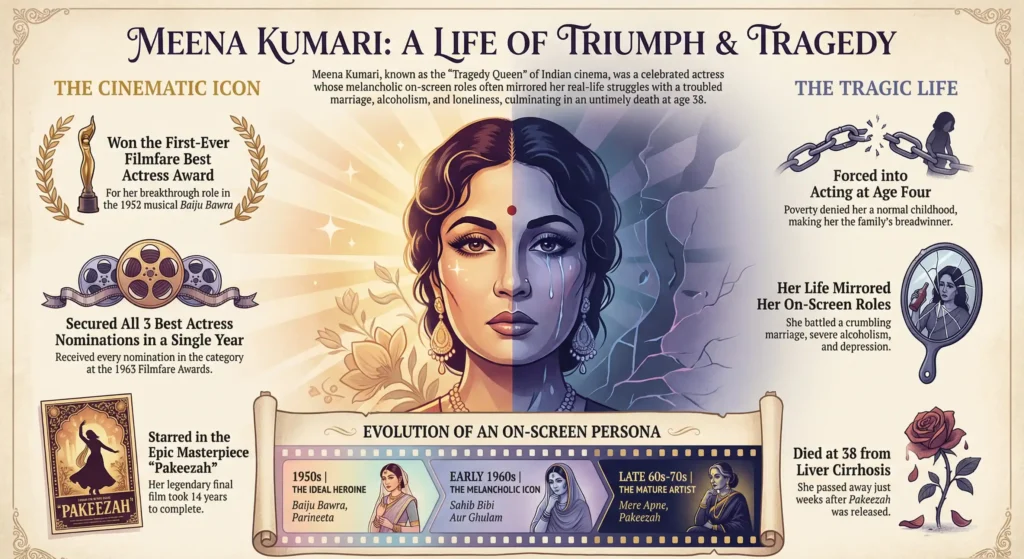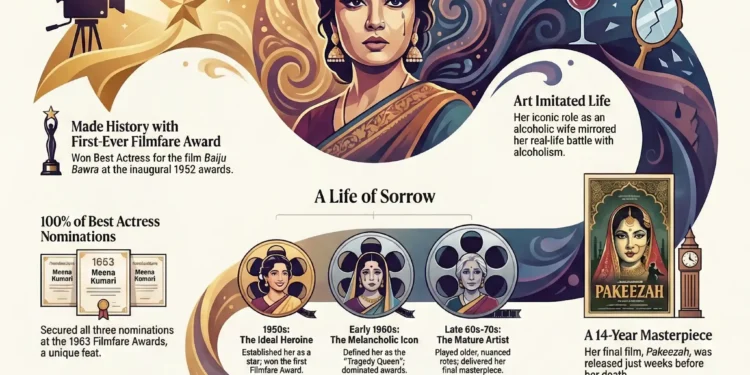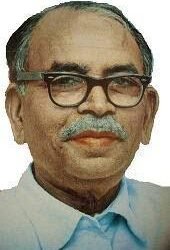Meena Kumari, born Mahjabeen Bano in 1933, was one of the most talented and tragic figures in Indian cinema history. Known as the "Tragedy Queen," she redefined the portrayal of Indian women on screen with her melancholic and intense performances. She made history by winning the inaugural Filmfare Award for Best Actress for Baiju Bawra (1952). Her personal life, marked by a troubled marriage to Kamal Amrohi, alcoholism, and loneliness, often mirrored her on-screen roles. Her swansong, Pakeezah, took 14 years to complete and was released just weeks before her untimely death at the age of 38 due to liver cirrhosis.| Attribute | Details |
| Full Name | Mahjabeen Bano |
| Screen Name | Meena Kumari (originally Baby Meena) |
| Date of Birth | August 1, 1933 |
| Birthplace | Bombay (now Mumbai), British India |
| Date of Death | March 31, 1972 (Age 38) |
| Profession | Actress, Poet, Playback Singer |
| Debut Film | Leatherface (1939) – Child Artist |
| Key Awards | 4 Filmfare Awards for Best Actress (Baiju Bawra, Parineeta, Sahib Bibi Aur Ghulam, Kaajal) |
| Spouse | Kamal Amrohi (Married 1952; Separated 1964) |
| Notable Works | Pakeezah, Sahib Bibi Aur Ghulam, Baiju Bawra, Mere Apne |
| Pen Name | Naaz (for her Urdu poetry) |
Early Life: A Star Born in Shadows
Born Mahjabeen Bano into a poor family of theatre artists, Meena Kumari’s life began with hardship. Her father, Master Ali Bux, unable to pay the doctor’s fees, briefly left her at an orphanage before guilt compelled him to bring her back. Poverty forced her into films at the tender age of four. Initially credited as Baby Meena, she became the breadwinner for her family, working in films like Leatherface and Adhuri Kahani. She never had a normal childhood, balancing work and survival, a theme that would haunt her throughout her life.
8 Defining Chapters in the Vikram Sarabhai Biography

The Rise: Making History
Her transition to adult roles was seamless. The musical Baiju Bawra (1952) was her breakthrough, earning her the first-ever Filmfare Award for Best Actress. This victory set the tone for her career. She became the go-to actress for complex, emotional roles in films like Parineeta (1953) and Sharada (1957).
- The Record Breaker: In 1963, she created history at the 10th Filmfare Awards by receiving all three nominations for Best Actress (Sahib Bibi Aur Ghulam, Aarti, and Main Chup Rahungi), winning for Sahib Bibi Aur Ghulam.
The Tragedy Queen
Meena Kumari’s on-screen persona of the suffering, sacrificial woman earned her the title “Tragedy Queen.” Her performance as Chhoti Bahu in Sahib Bibi Aur Ghulam (1962)—a lonely, alcoholic wife—is considered one of the greatest performances in Indian cinema. Tragically, the role paralleled her real life. As her marriage to director Kamal Amrohi crumbled, she sank into depression and alcoholism, which began to take a toll on her health.
6 Unfoldings in the Subrahmanyan Chandrasekhar Biography
Pakeezah: The Swan Song
Her magnum opus, Pakeezah, is a cinematic legend in itself. Directed by her estranged husband Kamal Amrohi, the film took 14 agonizing years to complete. By the final stages of shooting, Meena Kumari was gravely ill, yet she delivered a performance of ethereal beauty. The film was released in February 1972 to a lukewarm response but became a massive blockbuster following her death just weeks later in March 1972.
Quick Comparison: Eras of Emotion
| Era | Role Type | Key Films | Impact |
| 1950s | The Ideal Heroine | Baiju Bawra, Parineeta | Established her as a star; won the first Filmfare Award. |
| Early 1960s | The Melancholic Icon | Sahib Bibi Aur Ghulam, Dil Ek Mandir | Defined her as the “Tragedy Queen”; dominated awards. |
| Late 60s-70s | The Mature Artist | Mere Apne, Pakeezah | Played older, nuanced roles; delivered her final masterpiece. |
Curious Indian Fast Facts
- The Poetess: She was a gifted Urdu poet who wrote under the pseudonym Naaz. Her poetry was often dark, reflecting her loneliness.
- The 33% Cut: In the 10th Filmfare Awards (1963), she was the only actress nominated in the Best Actress category, securing all three spots for herself.
- A Pauper’s Death: Despite being a top star, she died with almost no money. Her hospital bills were reportedly paid by a well-wisher.
- Six Fingers: Like Marilyn Monroe (to whom she is often compared), Meena Kumari had a distinctive physical trait—her left hand was reportedly not perfect, which she often hid in films using sarees or dupattas.
- Singer Too: In her early career as a child artist, she sang playback for her own films before focusing solely on acting.
Conclusion
Meena Kumari was a poet at heart and an actress by profession, but above all, she was a soul in search of love. Her life serves as a poignant reminder that the brightest stars often burn the quickest. From the innocent Gauri in Baiju Bawra to the soulful Nargis in Pakeezah, she poured her own pain into her art, leaving behind a legacy that is as beautiful as it is heartbreaking.
7 Secrets of Padmanabhaswamy Temple Treasure
If you think you have remembered everything about this topic take this QUIZ
Results
#1. What historic record did Meena Kumari set at the 10th Filmfare Awards in 1963?
#2. Which iconic role is considered her greatest performance, paralleling her real-life struggles with loneliness and alcoholism?
#3. How many years did it take to complete Meena Kumari’s final masterpiece, ‘Pakeezah’?
#4. Under what pseudonym did Meena Kumari write her Urdu poetry?
#5. What was the cause of Meena Kumari’s death at the young age of 38?
#6. According to the ‘Quick Comparison’ table, which film is associated with her ‘Mature Artist’ phase in the late 60s and 70s?
#7. Which distinctive physical trait did Meena Kumari often hide in films using her dupatta or saree?
10 Remarkable Facts About Meghnad Saha Life and Achievements
What was Meena Kumari’s real name?
Her birth name was Mahjabeen Bano.
Which film won Meena Kumari the first Filmfare Award?
She won the inaugural Filmfare Award for Best Actress for the film Baiju Bawra (1952).
What was the cause of Meena Kumari’s death?
She died of liver cirrhosis at the age of 38, caused by years of alcohol addiction.
Who was Meena Kumari’s husband?
She was married to the famous film director and writer Kamal Amrohi.
How long did it take to make the movie Pakeezah?
The film took nearly 14 years to complete, delayed by the couple’s separation and Meena Kumari’s failing health.
Read more: https://curiousindian.in/nargis-the-graceful-soul-of-indian-cinema-june-1929-may-1981/














